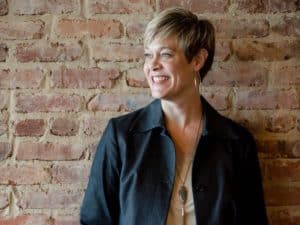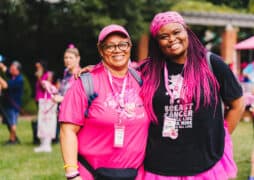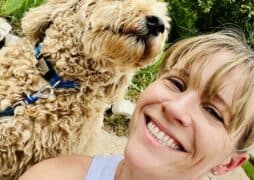Here, two inspiring survivors share life lessons following a life-changing diagnosis of breast cancer.
After the rigors of breast cancer treatment, doctors may declare lucky patients “cancer free”—meaning that there’s no evidence of cancer. And in this moment an exciting, yet uneasy, new chapter begins. Here, two breast cancer survivors share their own compelling stories once their doctors announced that there was no evidence of breast cancer: their sense of relief and joy as well as their efforts to embrace life with enthusiasm and optimism. Their most important advice to other breast cancer patients? Remain vigilant and continue to advocate for your health, and use your experiences to help others.
Live one day at a time. Even when a breast cancer patient has finished treatment and has no evidence of active disease, advocating for their own health care is still an ongoing priority: something that Monique Robinson, 36, a two-time breast cancer survivor, knows only too well. “After I’d finished my second course of treatment in 2017, my follow-up scan showed a strange mass on my lung that could mean the cancer had metastasized,” she recalls. Thankfully, it was just residual scarring from radiation—but since then she’s undergone two more cancer-related scares. “Each time, I’ve gotten reassuring news that it was benign,” she says. Monique tries to balance the crucial need to remain alert to any changes in her health with a desire not to have the anxiety rule her life. “I have to consciously make a point not start dwelling on what my doctors might find at my next scan. It’s my only way to stay sane—perpetual worry is no way to live.”
Stay optimistic. 53-year old Heidi Floyd was diagnosed with breast cancer 14 years ago when she was eight weeks pregnant. Her oncologists only gave her one option: terminate the pregnancy. Undaunted, she sought out a second opinion from oncologist George Sledge, MD, who now serves as Susan G. Komen’s Chief Scientific Advisor. Dr. Sledge assured her that while it would be difficult, he felt confident he could save both her and her baby. “He gave me a little glimmer of hope, and I clung to it throughout the pregnancy,” she recalls. She underwent six grueling months of chemotherapy, and gave birth to a healthy baby boy, Noah, a month later. “Seeing his face for the first time was an indescribable victory,” she says. She tapped into that glimmer of hope and determination to advocate for herself again when she was diagnosed with a recurrence in 2012. “I’d done what had seemed the impossible in 2005, and I knew I could do it again,” she says.
Lean on others for support. Floyd often suffers from what’s known as “scanxiety”—extreme stress and anxiety both during and after a follow-up cancer scan. “Before the advent of social media, I would just drive into the parking lot and bawl and tremble with fear,” she recalls. “Now I put on my gown, take a picture, and post it immediately on all my social media accounts. Within minutes, my Facebook feed is blowing up with encouragement.”
Know the warning signs for recurrence. After being treated for breast cancer, it is important to know what normal feels like for you, and to advocate for yourself if something feels off. “It’s always OK to get a second opinion if your gut tells you something is wrong and you feel your doctor is not listening to you,” said Floyd. According to Susan G. Komen, the symptoms for a recurrence of breast cancer that has metastasized (spread beyond the breast) may include things like shortness of breath, weight loss, bone pain, seizures or yellowing of the skin or whites of the eyes. While these symptoms are common and may not mean anything, discuss any symptoms with your health care team, especially if they last more than two weeks.

Adopt a carpe diem attitude. “The first time I was diagnosed with breast cancer, I thought, ‘okay, I’ll do my year of treatment and then everything will go back to normal,” Robinson recalls. “But the second time, I felt a sense of urgency to make the most of the life I have left.” She now travels with her husband at least twice a year to far-away, exotic locales such as Cook Island, Costa Rica, and Tokyo. “Whether I live for another five years or fifty, I want to make sure that my husband has those memories that will live on forever if anything does happen to me,” she says.
Let yourself live a little. One challenge of being a breast cancer survivor is striking a balance between wanting to enjoy life to its fullest versus making sure you do everything you can to prevent a future recurrence. “I lead a healthy, cancer-free lifestyle: I eat well, I exercise, I limit alcohol, and I take my daily preventative medication,” says Robinson. But “when I’m traveling, I do let myself have that one rare indulgence,” she admits.
Become an advocate. Once you’ve survived cancer—then the question many survivors face is, what do you do next? For many women, the answer lies in advocacy. “During my treatment, I’d sit with another woman during chemotherapy and come back the next Friday to discover she hadn’t made it,” recalls Floyd. “I’ve been given the privilege of life—now it’s my responsibility to help lift up other women struggling with a breast cancer diagnosis.” She now shares her story with groups as diverse as Google and the U.S. Congress, and consults with corporations to help them find creative ways to assist employees going through breast cancer. She also volunteers to speak, write articles on behalf of Susan G. Komen and is a part of the Pink Power Mom Network – a group of moms with breast cancer who provide help and support to patients and their caregivers.
To learn more about breast cancer or how you may help others touched by the disease, visit www.komen.org.
*This article first appeared on Health.com as part of a partnership with Susan G. Komen.



